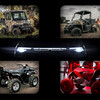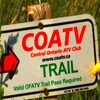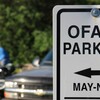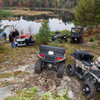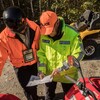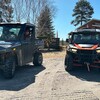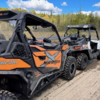
Powersports, Trailers and the Law
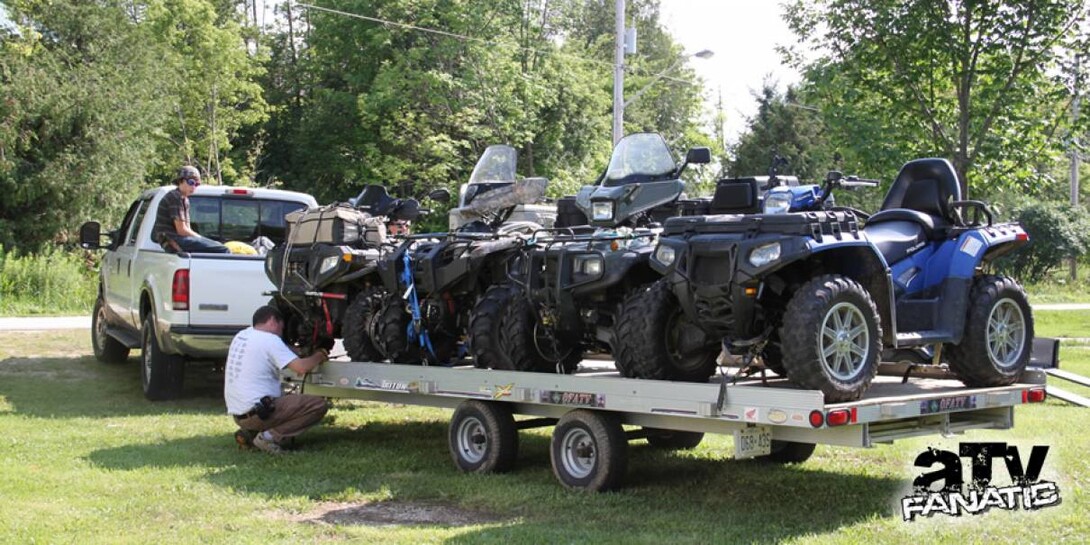
For those who do not know me: my name is David, I own an automotive repair shop, and I decided to write this because I had yet another frustrated customer bring in his tandem axle utility trailer and truck for an annual safety inspection, after recently getting nabbed in a roadside safety inspection - which cost him more than the trip to the dump to get rid of a load of garbage bags.
One frequent question I get asked or have to deal with during annual MTO safety blitzes is, "Does my truck and or trailer require an annual safety inspection?"
This is sometimes a simple question and other times a difficult one.
It's very unfortunate that most vehicle owners do not take the time to find out whether they are breaking the law when it comes to the Highway Traffic Act, until, of course, they get stopped by an MTO enforcement officer, or a law enforcement officer who is authorized to perform road side safety inspections! Of course, no one wants to spend money on their vehicle or trailer unless it's broken — I myself hate spending money on my vehicles — but when pulled into a safety inspection and caught doing something wrong, I assure you it is going to go one of two ways: a slap on the wrist or slap to your wallet!
Some of the fines can get quite costly, and I know because I have seen some of my clients' charges: a simple stop for inspection might start with determining whether or not you need the dreaded "yellow sticker(s)," you may get your vehicle or combination of vehicle and trailer weighed on site with portable scales, your load securement will be inspected, the condition of your vehicle and or trailer will then follow, right down to the dreaded e-brake test.
Then the outcome: either you're on your way, or the fine book comes out to pay your bank account a visit! Oh, did I mention they could also pull your plates on the spot!! Then your choices are: either have your vehicle/trailer towed to a repair facility, or the scrap yard! You will be required to prove that the repairs have been completed, or that it passes a safety inspection. This applies to both the vehicle and trailer, depending on the faults found. Also, if you happen to be overloaded, you may have to unload to the acceptable weight of your combination of vehicle/trailer, or contact someone who holds a valid licence to haul the weight (as long as the vehicle/trailer combination is approved for the weight).
A quick review of the of the Ontario Court Of Justice web site under Set fines shows fines starting at $85 and going up... way up: an insecure load on a commercial vehicle is a $310 fine! Wow!
Now some of you may say, "Wait, I don't drive a commercial vehicle." Well, I hate to say this, but this is the definition you need to know:
"Truck" includes, but is not limited to truck tractors, straight trucks, pickup trucks, curb side/cube vans, trade vans/panel trucks, and passenger vans and two- and four-wheel drive sport utility vehicles while being used to transport cargo, other than personal effects, with one or more of the vehicle's rear seats removed. This applies regardless of how the vehicle is plated: e.g., car, truck or farm plated.
Something most operators of pick-up trucks are unaware of is that it is always registered in Ontario as "commercial" (hey, don't believe me: open your ownership, look at the top right of the piece labeled "vehicle portion." It will say "Commercial Fit" if it is plated). I get caught in this conversation even with people who drive heavy trucks for a living!
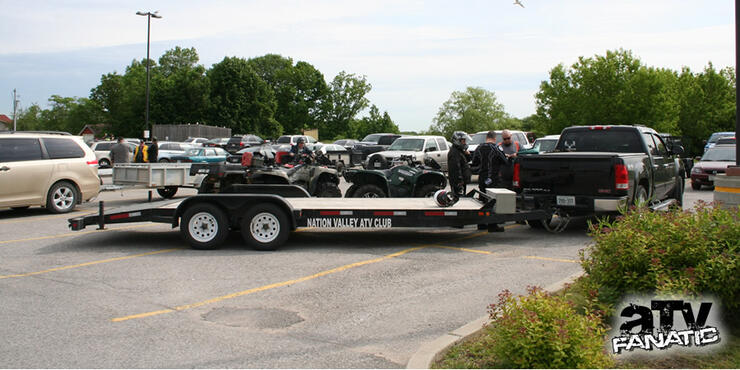
All this being said, here is what the MTO has to say about Annual inspection:
Annual Inspection and Safety Standards Certificate (SSC):
• Trucks, trailers and converter dollies alone or in combination with a total gross weight, registered gross weight or manufacturer's gross vehicle weight rating exceeding 4,500 kilograms (kg),(9,920 lbs)
Annual Inspection, Semi-annual Inspection and Safety Standards Certificate:
• Buses designed for 10 or more passengers excluding those with a manufacturer's gross vehicle weight rating of 4,500 kg or less used exclusively for personal use,
• Accessible vehicles modified to be used for the purpose of transporting persons with disabilities, excluding those used only for personal purposes, and
• School purposes vehicles operating under contract with a school board or other authority in charge of a school being used for the transportation of six or more children or adults with a developmental disability.
Check out the MTO's Frequently asked questions, as I have only provided a snippet of what is there.
Also, for everyone's information, I will point out a couple of key phrases that commonly get overlooked: "COMBINATION" and the different "WEIGHT" statements. Everyone should know that the standards apply whether the vehicle/trailer is empty or loaded. The weight of your tow vehicle and its maximum cargo including you is contained on the driver's door sticker as "GVWR".
What do the different weight terms mean? Here are the terms you should know:
Registered Gross Weight (RGW)
The RGW determines the fee paid for a truck or bus licence plates. RGW is based on, and must be at least equal to, the actual weight of the truck and its heaviest load or in the case of a bus the empty weight of the bus plus 60 kg per passenger (40 kg per passenger for school buses) based on the seating capacity of the bus. Generally the weight of a towed trailer and its heaviest load are added to the RGW of the truck. Load includes the driver, passengers, fuel, equipment, tools, etc. A trailer does not have a RGW.
The RGW is indicated on the right portion (plate portion) of a truck's or bus's permit, to the right of "REG. GROSS WT" and is in kilograms. One kilogram equals 2.204 pounds and one pound equals 0.4536 kilograms.
Gross Vehicle Weight Rating (GVWR)
The GVWR of a vehicle is a weight rating, established by the manufacturer, that indicates the maximum gross weight that the vehicle is designed for and includes the empty weight of the vehicle with the maximum payload. The GVWR of a vehicle is stated on the manufacturer's federal compliance label – usually on the driver's door or door post on a truck or on the left side near the front on trailers.
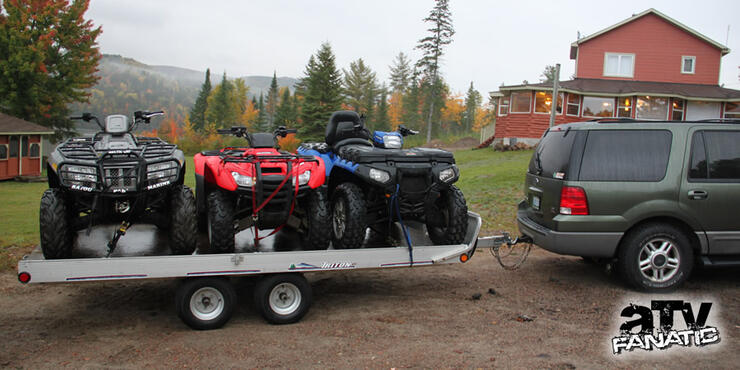
Gross Weight
The Gross Weight of a vehicle is the actually weight of the vehicle as would be determined by weighing the entire vehicle and its load on a weigh scale.
So if you choose to stay legal, you need to have your vehicle/trailer inspected and brought up to current safety standards, then have a Yellow Annual Safety Inspection Sticker affixed to the vehicle/trailer, as well as carry a copy of the certificate of inspection with you. This can be done at any garage that is licensed to repair your class of vehicle/trailer and is authorized as a "Motor Vehicle Inspection Station." If you decide to do any repairs yourself, make sure that you are meeting the National Safety Code before paying to have the inspection done. The best bet is to use a qualified, reputable, licensed repair facility; they have the manuals and updates from the MTO to know what needs to be inspected as well as updated to meet code in some cases.
I have provided you with a condensed version of my opinion based on my years of experience in this trade, as well as review of the material made available to me by elaws, MTO inspection manuals, and personal communication on an ongoing bases with enforcement officers from both the MTO and OPP.
It is my sole intention to inform you, I leave it to you the reader to follow up!
Recommended Articles

The Complete 2025 List of ATV Events in Ontario

Guided ATV Tours

Confessions of a First Time ATV Rider: Mattawa Voyageur Multi Use Trails

6 Reasons Why Mattawa is Canada's Off Road Capital
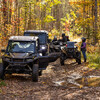
ATV Riding the Ottawa Valley: A 2-Day Itinerary

18 Best ATV Cabin Rentals

Never Get Lost Again

As If Anyone Needed Convincing

5 Things I Learned ATVing For the First Time

Ontario’s North Country ATV Trout Tour

Vintage ATVs: A Guide to Your Favourite Rides


